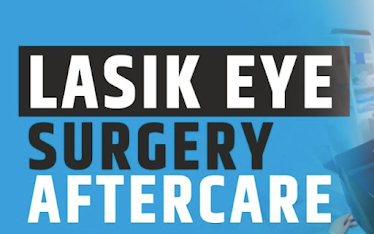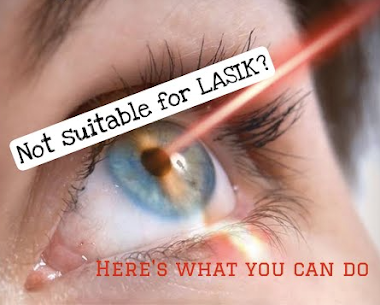HOW CAN I PROTECT MY EYES AFTER LASIK?
INTRODUCTION
LASIK (Laser-Assisted In Situ Keratomileusis) has transformed vision correction, giving millions of individuals better vision and a decreased need for glasses or contact lenses all around the world. LASIK is a safe and successful operation, but for the best healing and long-term eye health, it must be followed by good post-operative care.
By reshaping the cornea—the transparent front portion of the eye—LASIK aims to improve vision by ensuring that light entering the eye is appropriately directed onto the retina. An ophthalmologist, a physician with training in surgery and eye care, conducts the procedure.
Overview of the LASIK Treatment
Preoperative Evaluation: To assess the patient's eligibility for LASIK, the ophthalmologist thoroughly examines the patient's eyes before the procedure. In this examination, the corneal thickness, the degree of refractive error, and the general health of the eyes are all measured.
During the LASIK treatment, the surgeon creates a thin flap on the cornea using a specialized ME called a microkeratome or a femtosecond laser on the cornea's outer surface. The corneal tissue beneath the flap is shielded by the flap.
Corneal reshaping: Following the creation of the corneal flap, the surgeon utilizes an excimer laser to precisely remove corneal tissue. The cornea is effectively reshaped to the required curvature based on the patient's refractive defect thanks to the laser's ultraviolet radiation, which disrupts the molecular bonds of the corneal tissue without creating heat. Repositioning the corneal flap so that it adheres without the need for stitches allows the surgeon to reattach it after the cornea has been reshaped.
Healing and recovery: The corneal flap adheres quickly, and recovery happens rather quickly. Within a day or two, most patients see an improvement in their vision, and the majority report little to no pain while the wound heals.
Millions of patients have benefited from the procedure's advancements in ophthalmology, which have reduced their need for glasses or contact lenses and enhanced their eyesight.
Take to safeguard your eyes following LASIK surgery.
Your ophthalmologist will provide you thorough post-operative instructions right after your LASIK procedure. To encourage appropriate healing and lower the risk of problems, it is essential to strictly adhere to these instructions. Use the eye drops that have been recommended for you, refrain from rubbing your eyes, and keep all scheduled follow-up appointments with your eye surgeon.
Avoid Direct Sunlight and Protect Your Eyes
Your eyes may become more sensitive to light during the initial recovery phase after LASIK. When going outside, especially on sunny days, it's crucial to wear sunglasses. Sunglasses of the highest caliber that provide UV protection can protect your eyes from damaging ultraviolet radiation and lessen discomfort brought on by bright light.
Avoid Exhausting Activities
Even though LASIK recovery is frequently quick, it's still important to give your eyes enough time to recover. For at least a week or as directed by your eye surgeon, refrain from doing any vigorous activity like heavy lifting, rigorous exercise, or contact sports. Your eyes may experience unnecessary strain from these activities, which could also delay the recovery process.
Rest Your Eyes Often
Your eyes may temporarily feel dry or irritated following LASIK. It is helpful to rest your eyes periodically to reduce these symptoms, especially when engaging in screen- or reading-intensive activities. The 20-20-20 rule, which suggests taking a 20-second break every 20 minutes to stare at something 20 feet away, can be useful.
Keep the Environment Clean
Keeping your environment dust- and allergen-free is essential during the post-LASIK healing period. Your eyes may become irritated by airborne particles, which could develop into problems. To reduce the risk of infection and inflammation, think about using air purifiers and frequently cleaning surfaces.
Use Safety Glasses
Wearing protective eyewear is advised if you engage in any activity that could put your eyes in danger, such as swimming, using power tools, or playing sports. Your eyes can be protected from particles, chemicals, or accidental impact using safety goggles or glasses, which can help you avoid any difficulties.
Avoid using hot tubs and swimming.
It is advised to avoid swimming in pools, hot tubs, or any other bodies of water during the first few weeks following LASIK since they may contain bacteria that could cause an eye infection. The healing process could be hampered by waterborne toxins, which could also be dangerous for your eyes.
Reduce Screen Time
Digital eye strain brought on by too much screen time may make recovering from LASIK more uncomfortable. Limit the time you spend using electronics, and if you must, modify the screen's settings to minimize the output of blue light and think about using lubricating eye drops to keep your eyes moist.
CONCLUSION
Making the decision to get LASIK surgery can transform your life and greatly enhance both your vision and quality of life. To achieve the best results and sustain eye health in the long run, protecting your eyes during the healing process is crucial. You may make sure that your recovery from LASIK goes smoothly and successfully by adhering to your ophthalmologist's post-operative instructions, wearing protective eyewear, and taking the required precautions. Remember that everyone heals differently, so if you have any questions or encounter any strange symptoms, get in touch with your eye doctor right away for expert advice.
It's important to remember that while LASIK can be incredibly effective, it does not ensure everyone will have a lifelong flawless vision. Some people can see their correction reverse over time or acquire new vision problems unrelated to the initial operation.
For the right applicants, LASIK is regarded as a safe and effective operation that has helped many people live better lives by giving them clean vision and eliminating their dependence on corrective lenses. But like any surgical surgery, LASIK has some risks and potential side effects, so it's important to get a full evaluation and have a complete discussion with an experienced eye surgeon before deciding whether to have the procedure.
There are different ways to take care of eyes after lasik check here: https://www.visualaidscentre.com/blog/how-take-care-eyes-after-lasik/



Comments
Post a Comment